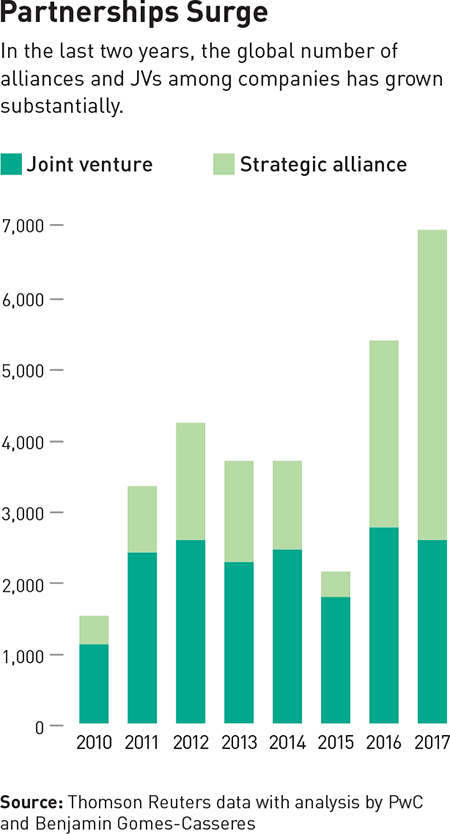By Ben Gomes-Casseres | Originally in HARVARD BUSINESS REVIEW |
When I started to research business alliances over 25 years ago, an executive at General Motors told me: “If the business is worth doing, we’ll do it ourselves.” Today, few major companies still believe that they can go it alone — even when a business venture is worth a lot. External partnerships are not only more common, but as business bets go, they now involve much higher stakes. A company’s value can rise and fall dramatically by how well it manages partnerships. In this new world, you are worth as much as your external relationships.
Front-page news for months now, a striking example is BP’s recent attempts at a partnership with Rosneft in Russia. When BP struck the deal in January of this year, it was hailed as a master stroke to regain standing in the markets after its disaster in the Gulf of Mexico. BP was to exchange shares with Rosneft and gain access to Russia’s hugely promising Arctic oil fields. But the story soon turned sour when BP’s existing partners in Russia claimed that the deal violated their existing joint-venture contract with BP, which they said gave themexclusive rights to work with BP in oil and gas exploration in Russia. Two courts outside of Russia have sided with BP’s existing partners. And even though Rosneft has strong connections to the Russian government, the matter could not be settled. With the game in overtime, proposals reaching in the tens of billions of dollars were discussed to buy out the existing partners. Officially, the BP-Rosneft deal appears dead for now.
Other high-stakes partnerships run into problems over time, after investors have long taken their value for granted. Yahoo!’s alliance in China is only the most recent example of this. For some time now, analysts have attributed a substantial chunk of Yahoo!’s total value to its joint ventures in Japan and in China, where these JVs hold strong positions in booming markets for online business. Small wonder that Yahoo!’s stock fell over 7% on news out of China that the company’s JV partner had transferred some of the joint business to its wholly-owned operation. Initial reports suggested that Yahoo! had been unaware of this move. But Yahoo! management has since responded rapidly, and is reportedly working out a new arrangement with its partner. Precicely how Yahoo! will be compensated for this transfer remains to be seen, but the value of the China partnership to Yahoo! has been underscored dramatically.
These two high-stakes partnerships have one thing in common that should serve as a warning for others: They involve emerging market deals in which governments play a big role and contracts may be hard to enforce in courts. As a result, the usual levers of control often assumed to exist by Western companies are elusive.Partnerships are always to some extent open-ended contracts, of course, and complete control is by definition absent. In the emerging-market context, this is so in spades.
Neither BP nor Yahoo!, to be sure, had much choice but to use a partnership in expanding their business in these markets. But neither are their stories extreme cases at all. Other examples, in airlines, consumer goods,telecommunications, and medical industries, and in other emerging markets show how good partnerships can add economic value to a company, or how broken partnerships can destroy that value. That is why so many global industrial giants that had long gone it alone have changed their tune. IBM was one of the first to make this switch back in the 1990s, after its near-death experience. General Motors too has been forced by circumstances to adjust its approach; its JVs in China today account for the greater part of its profits.
The key to success in managing external partnerships is to understand the limits of your power and to invest a healthy amount in managing your alliances. Furthermore, investors must learn how to gauge the value of these deals to the company. I suggest two simple rules. First, don’t be wowed by wedding-day promises — many partnerships fail and leave behind a trail of debris. Second, ask tough questions, not only about a company’s own operations, but also about its relationships. What trade-offs were made in striking a deal? How will the new relationship be governed? And how will the company capture value from its partnership? If the partnership is worth doing, you — and management — need to ensure that the bet will pay off.








